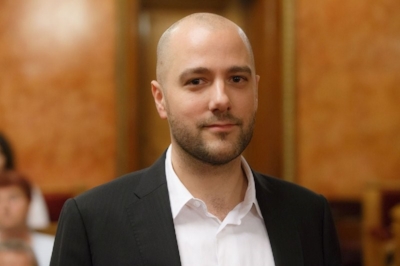
Dr. Luka Culiberg
1) What are your research interests?
My research interests are epistemologically based in what one could call “historical sociology”, focusing on how social structures and the ideologies accompanying them change through social processes. In this context, I am mainly interested in modern Japanese history and society, specifically in the area of language ideologies and national identity and the connection between the institution of “standard” (or national) language and nation.
2) What is your current research project about?
In my research for my PhD I focused on changes in language ideologies in the context of transforming Japanese society into a nation after Meiji restauration. At the moment I am editing an issue of our journal (Asian Studies) dedicated to Bushidō as another ideological mechanism which has played an important role in transforming Japanese society through imbuing new Japanese nationals with dubious “samurai ethic” and transforming the concept of Bushidō into a mystical ideology referred to as “the soul of Japan”.
3) Please describe shortly the main stations of your academic career.
I graduated the four-year program of Sociology of Culture and Japanese Studies (double major) at the University of Ljubljana. During my undergraduate study, I got a JASSO scholarship to study one year at the University of Tsukuba. After graduation, I enrolled in a PhD program in Sociology at the University of Ljubljana. During my PhD course, I also received a MEXT scholarship and I was as a research student (kenkyūsei) for a year and a half at Hitotsubashi University, with Professor Yasuda Toshiaki as my advisor. After returning from Japan, I took up the post of assistant lecturer at the University of Ljubljana and continued to teach at the Department of Asian Studies. Before finishing my PhD thesis, I received a Japan Foundation Fellowship and spent another year at Hitotsubashi University completing my dissertation. After gaining the degree, I continued to teach at the Department of Asian Studies as assistant professor (docent in our Slovenian academic system).
4) How has your participation in the EAJS PhD Workshop 2011 benefitted your research and/or your career?
Since I had done most of the work on my dissertation alone in solitary isolation, my participation in the EAJS PhD workshop, which made it possible to present some ideas and the course of my discussion, was very beneficial. Discussing your arguments with advisors as well as with other PhD candidates was not only a great experience, but almost a necessary step in the long and often disheartening process of a PhD project, which inevitably leads to many dead ends or leaves you hanging over precipices. It is the comments by people unburdened by your course of argument, who can show you the way across or out of this dead end. I only wish I could have had that opportunity more than once, especially in the final stage of writing. This would definitely have further improved my thesis.
5) What do you think are the opportunities such workshops can offer to junior scholars?
It is definitely a great opportunity to discuss your thesis not just with your PhD advisor, but with researchers, who are working in other areas and who can offer a different perspective and compel you to present your argument in such a way that it is of interest and understandable to researchers from various fields of Japanese Studies. Besides it is a great opportunity for networking. Being in a foreign place for a few days with fellow PhD candidates sharing a similar experience can form strong bonds for the future.
6) Please name three of your major publications
CULIBERG, Luka. Japanese language, standard language, national language : rethinking language and nation. Asian studies, vol. 1 (17), issue 2. 1st ed. Ljubljana: University Press, Faculty of Arts. 2013, pp. 21-33. http://revije.ff.uni-lj.si/as/article/view/408/783
CULIBERG, Luka. Speaking a common language: on the unity in the human sciences and the question of school history curricula. V: SHIBA, Nobuhiro (ur.), et al. School history and textbooks: a comparative analysis of history textbooks in Japan and Slovenia, (Zbirka Vpogledi, 7). Ljubljana: Inštitut za novejšo zgodovino. 2013, str. 163-189.
CULIBERG, Luka. Kangaku, kogaku, kokugaku, rangaku : reinterpretation of Confucianism in the nation building process in Japan. V: ROŠKER, Jana S. (ed.), VISOČNIK, Nataša (ed.). Contemporary East Asia and the Confucian revival. Newcastle upon Tyne: Cambridge Scholars Publishing. 2015, pp. 3-22.

